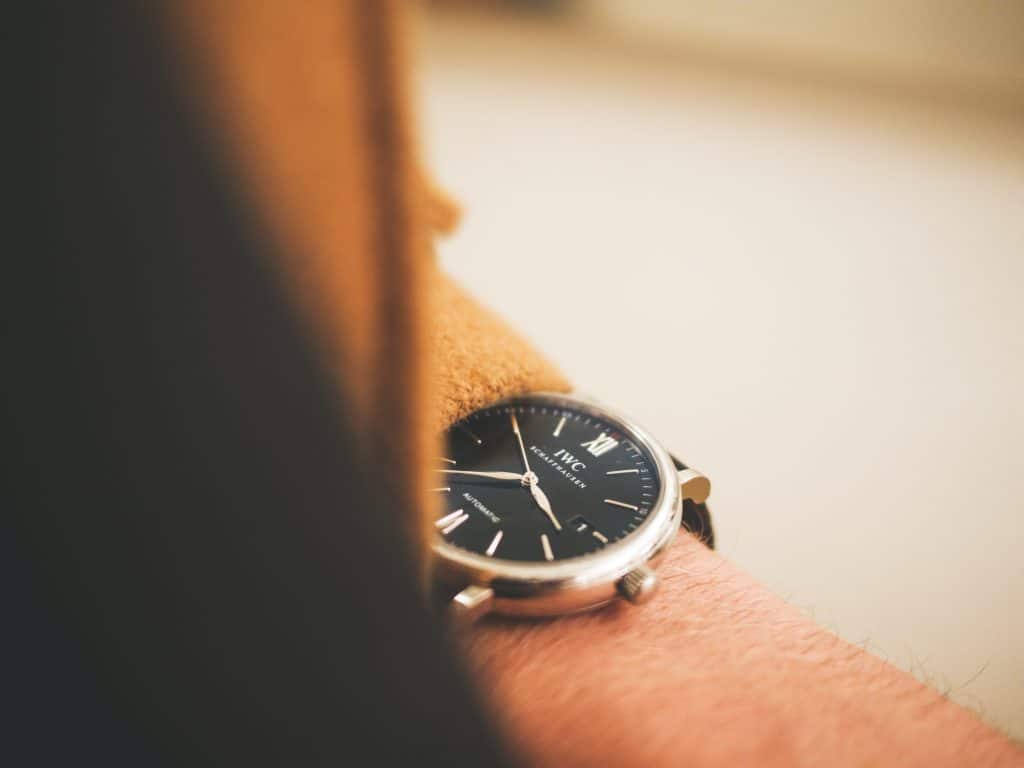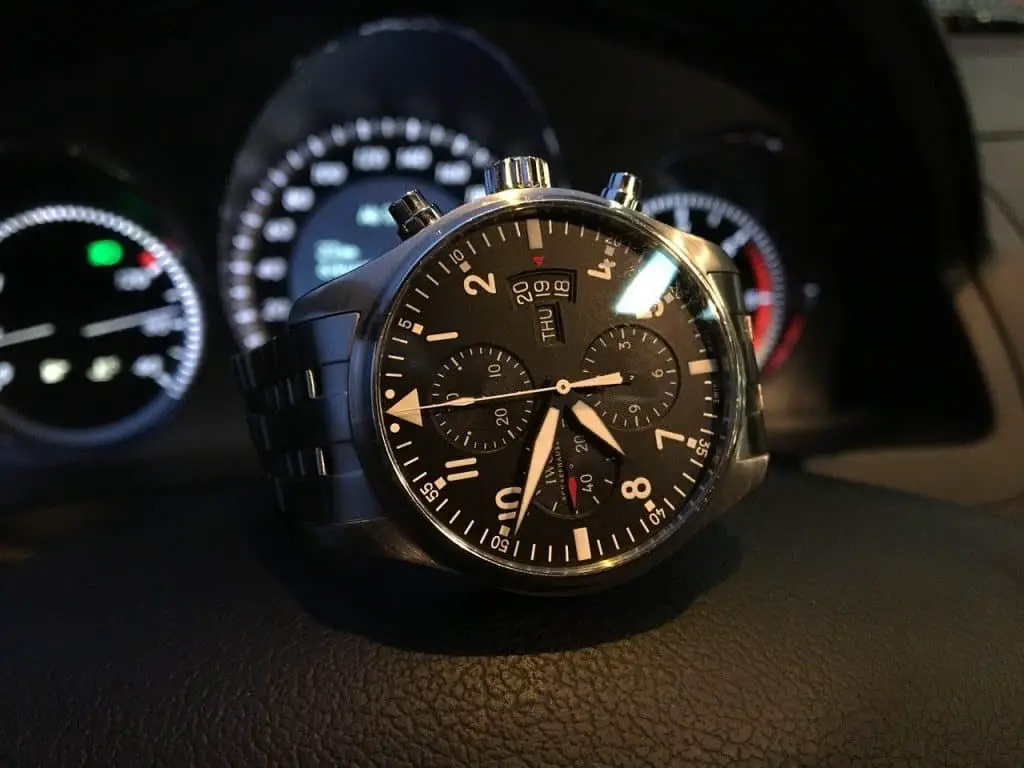IWC Schaffhausen has been a pillar in the watch world ever since its inception in 1868. The brand combined Swiss watchmaking with American engineering, but is IWC actually a luxury watch brand?
IWC is widely regarded as a luxury watch brand. IWC has a rich watchmaking history, they produce their own in-house movement and utilize high-quality materials and precious metals. The IWC name has become synonymous with luxury watches.
In order to be classed as a luxury watch brand, the brand needs to meet some requirements. Now, these aren’t set in stone, and the term ‘luxury’ can have a different meaning for everyone, but this article will cover some generally agreed to guidelines and see how IWC stacks up!

Table of Contents
Is IWC A Luxury Watch Brand?
The term ‘luxury’ can have a different meaning for everyone. For some, it’s a luxury to even own a watch, and for others, a $2500 watch is just another for the collection. And although the price of a product does play a role in its luxury feel, it isn’t the only factor that determines whether it’s ‘luxury’ or not.
Although there aren’t any set-in-stone rules for when a watch is a luxury watch, there are some guidelines and requirements set in place. The most important one is the movement. Most people do not consider a watch to be a luxury watch if it does not contain an in-house-made movement.
Aside from the movement, we also look at the materials used to make the watch, the quality of the watch itself, and lastly, the name and price of the watch.
The Movement
In the eyes of watch enthusiasts, the movement is the most important factor to whether or not a watch is a luxury watch. Most enthusiasts will disregard any brand as a luxury watch brand if they outsource their movement. It’s one of the primary reasons why a brand like TAG Heuer isn’t always seen as a luxury brand.
But why is an in-house movement so important? Well, this description of IWC’s Calibre 69 perfectly sums it up:
It took 8 years to develop the Calibre 69 movement, which is featured in the iconic Portugieser Chronograph.
It took eight years to develop the movement. Eight entire years. And that’s precisely why an in-house movement is so important. It’s the heart of the watch, and having it made in-house shows that every single part of the watch is assembled in-house and upholds the in-house quality standards.
A lot of brands outsource their movement from Swatch’s ETA, the largest movement manufacturer. ETA movements are by no means bad (they’re actually amazing), but outsourcing such an important part of the watch feels like cutting corners. And that’s not something you’d want for a luxury watch.
Some even look at it this way: If the heart of the watch is 100% Swatch group due to the ETA movement, then what does that make the watch?
IWC used to outsource their movements to third parties, but they gradually replaced them with their in-house movement. Every IWC watch produced nowadays is guaranteed to have a movement that was produced in-house.
Namesake
The name of a luxury brand is equally as important as the quality. Names like IWC, Rolex, or Patek Phillipe command a certain sense of respect. People know it’s a luxurious brand with high-quality and expensive timepieces.

It’s actually a lot more important than you may think. Seiko is a well-respected watch brand that isn’t quite a luxury watch brand. On the other hand, their sister company, Grand Seiko, is in every sense of the way a luxury watch brand. However, since it includes the more recognizable ‘Seiko’ name, most people don’t see Grand Seiko as a luxury watch brand, even if it is.
IWC is, without a doubt, linked to luxurious watches. It’s a name that commands respect. People know that IWC produces outstanding and luxurious watches. So even though this doesn’t have anything to do with the quality of the actual watch itself, it is definitely a contributing factor to make it a ‘luxury’ watch brand.
Materials & Manufacturing Process
When you buy a product from a luxury brand, you expect the product to actually be luxurious. And aside from making a high-quality timepiece, luxury watch brands typically include exotic and precious metals to achieve that luxurious feel.
Materials like gold, titanium, and even diamonds are often incorporated in the design of a luxury watch. IWC uses 18K gold, bronze, titanium, and platinum, just to name a few, so they definitely tick that box.
Aside from precious metals, IWC uses a sapphire crystal to cover the face of the watch, which is the most durable and expensive material for the watch’s face. These materials are also a good reason for IWC to bump up the price even more.
And to top it all off, every single IWC watch is hand-assembled in an official IWC factory. Hand-assembling every watch ensures that every single watch upholds the quality standards of an official IWC watchmaking expert.
Assembling the watch in-house also ties back to the earlier part where we talked about outsourcing the movement. If your watch is (almost) entirely assembled and produced by a third party, is it even an IWC watch at that point?
IWC definitely fits the ‘luxury watch brand’ guidelines regarding the materials used to make the watch and the manufacturing process. Your watch will be made out of high-quality and exotic materials, but it will also be precisely assembled by an in-house IWC expert.
Price
Like the name of the brand, the product’s price also plays a role in the ‘luxury’ feeling. A high price creates a barrier to entry, and a barrier to entry creates exclusivity. And the exclusivity is exactly why people are prepared to spend a lot of money on a luxury watch.

By wearing a luxury timepiece like an IWC, you’re part of a small selection of people who can afford one. It’s the whole idea behind ‘luxury goods’.
With an average price of about $5000 per watch, it’s safe to say that IWC watches carry that luxury feeling that comes with a high price tag.
Are IWC Watches Valuable?
IWC watches are highly valuable. IWC watches are part of a select group of watches that don’t depreciate all that much, so the value of an IWC watch will always hover around the retail value. There’s also a chance that your IWC watch slightly increases in value.
Unlike popular belief, most luxury watches aren’t all that great at holding their value. The typical (luxury) watch depreciates about 50% during the first couple of years, after which, it starts to stabilize.
IWC watches, on the other hand, are pretty good at retaining their value. This ensures that the monetary value of an IWC watch will always hover around the retail value. Sometimes it depreciates, and sometimes it appreciates.
Aside from the retail value, an IWC watch also holds intrinsic value. We discussed the many exotic and precious materials used to make an IWC watch, which holds a value in and of itself.
Additionally, there’s also emotional value. Watches are a popular choice of heirloom, so your IWC watch may hold more than just a monetary value.
